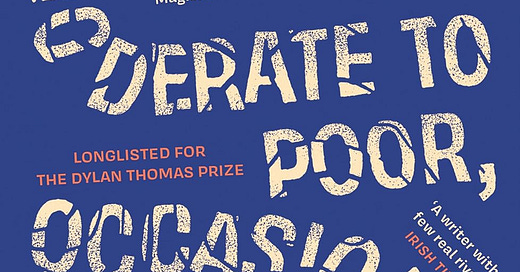Moderate to Poor, Occasionally Good by Eley Williams
The best-written work on this year's shortlist for the Dylan Thomas Prize
Scrimshaw
Not knowing what else to do, I send you walruses.
It’s an online feed maintained by the Alaska Department of Fish & Game with cameras trained on a state sanctuary twenty-four hours a day, seven days a week. The caption claims that what you’re looking at is one of the largest gathering places in the world for Pacific walruses. If the season’s right, you can watch 15,000 walruses rolling about and sunning themselves: puffy and hairy and taking stock of their walrus days. It’s a go-to site for me, bookmarked and ready for whenever insomnia has me in its jaws. There is audio too: one cursor nudge and your speakers thrum with huffing and wuffing, moustachioed blurts and blusterings of never-footed scuffling all in real time.
By this point we had been messaging for hours, my face close to the phone screen, imagining you doing the same. A whole town stretched between us, and it was something of a comfort to consider the surface of our separate skins blued or bluewn or bluesed by the same pixel-light, typing against our own private darknesses.
We had dispatched small talk, sweet talk, sweet nothings and then came your message stating that you were feeling unhappy.
We’re all feeling unhappy, I thought. Would that be a helpful thing to say? I meant it with solidarity but perhaps it would read as dismissive. Flushed with responsibility for your state of mind I flexed my thumbs, considering my options. I couldn’t ask you about your day because perhaps it was the cause of your unhappiness and making you dwell on it would simply compound the problem. I couldn’t tell you about my day because that certainly was the cause of my unhappiness, and now wasn’t the time to be competitive. I couldn’t comment on the weather, or the politics, the price of either and neither of those things because it all led to the same thing: unhappiness unhappiness unhappiness.
I typed the first letter of possible responses to you, playing for time. I thought about the corresponding three rippling dots on your phone screen and read your message again.
The word unhappy implies something of a void. A state of not-happiness, sure, but not necessarily anyone actively gasping in despair. I twitched my thumb away from our conversation to check an online thesaurus. Cheerlessness, desolation, despair, despondency, dolefulness, downheartedness, gloom, gloominess, glumness, malaise, wretchedness: I could ask you which one might be the most appropriate, listing them in alphabetical order so as not to imply my own personal hierarchy in terms of the terms.
I returned to your message none the wiser but making sure I typed something in the field so that three dots would show I was keeping you company. You didn’t know I was stalling rather than composing. Those dots change in character depending on one’s mood: the same ellipsis could just as easily signal a drumroll of anticipation, a trail of Hansel and Gretel breadcrumbs leading you on, or the side of a rolled dice when your guess is as good as mine. I dithered and felt the pressure of the dots out there shifting, undulating, modulating the shade of the blue light on your face as you waited for a message to materialise.
I drafted a breath then deleted it.
Moderate to Poor, Occasionally Good hums with fossicking language and ingenious experiments in form and considers notions of playfulness, authenticity and care as it holds relationships to their sweet misunderstandings, soured reflections, queer wish fulfilments and shared, held breaths.
SHORTLIST FOR THE 2025 DYLAN THOMAS PRIZE
Rapture's Road by Seán Hewitt
Glorious Exploits by Ferdia Lennon
The Safekeep by Yael van der Wouden
I Will Crash by Rebecca Watson
Moderate to Poor, Occasionally Good by Eley Williams
The Coin by Yasmin Zaher
Submitting work to Auraist
We offer writers a fast-growing audience of tens of thousands of discerning readers, including many world-class writers, major publishers and literary agencies, and journalists at the highest-profile publications.
If we publish your work, we’ll invite you to answer our questions on prose style. Your answers will be considered for inclusion in the published collection of these pieces by many of the world’s best writers.
The following submissions are welcome:
Books published in the last year
Works serialised on Substack
Short stories
Start the process by signing up for a paid subscription below. Then email your work to auraist@substack.com.
We look forward to reading it.






